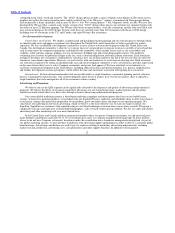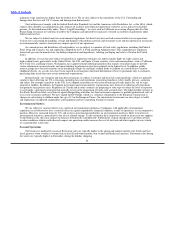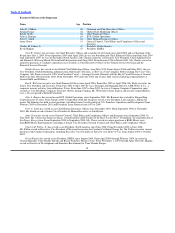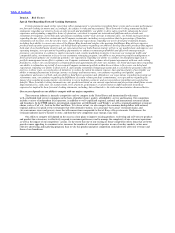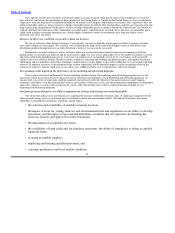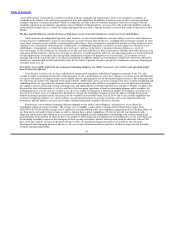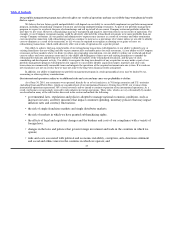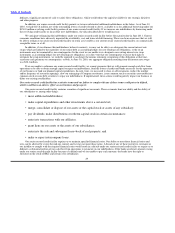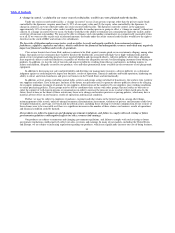Burger King 2010 Annual Report Download - page 22
Download and view the complete annual report
Please find page 22 of the 2010 Burger King annual report below. You can navigate through the pages in the report by either clicking on the pages listed below, or by using the keyword search tool below to find specific information within the annual report.
Table of Contents
Some of our competitors have significantly greater resources than we do, and therefore we may be at a disadvantage in competing
with them.
Some of our competitors have substantially greater financial resources, higher revenues and greater economies of scale than we
do. These advantages may allow them to react to changes in pricing, marketing and the quick service restaurant segment in general
more quickly and more effectively than we can. Some of these competitors spend significantly more on advertising, marketing and
other promotional activities than we do, which may give them a competitive advantage through higher levels of brand awareness among
consumers. In addition, our major competitors may be able to devote greater resources to accelerate their restaurant remodeling and
rebuilding efforts, rapidly expand new product introductions or implement aggressive product discounting, which could give them a
competitive advantage and adversely affect traffic, sales or profitability at our system restaurants. Furthermore, in a difficult economy
we believe that these competitive advantages arising from greater financial resources and economies of scale may intensify thereby
permitting our competitors to gain market share. Such competition may adversely affect our revenues and profits by reducing revenues
of Company restaurants and royalty payments from franchise restaurants.
The market for retail real estate is highly competitive. Based on their size advantage and/or their greater financial resources, some
of our competitors may have the ability to negotiate more favorable ground lease terms than we can and some landlords and developers
may offer priority or grant exclusivity to some of our competitors for desirable locations. As a result, we may not be able to obtain new
leases or renew existing leases on acceptable terms, if at all, which could adversely affect our sales and brand−building initiatives.
Economic conditions are adversely affecting consumer discretionary spending and may continue to negatively impact our business
and operating results.
We believe that our sales, guest traffic and profitability are strongly correlated to consumer discretionary spending, which is
influenced by general economic conditions, unemployment levels, the availability of discretionary income and, ultimately, consumer
confidence. A protracted economic slowdown, increased unemployment and underemployment of our customer base, decreased salaries
and wage rates, increased energy prices, inflation, foreclosures, rising interest rates or other industry−wide cost pressures adversely
affect consumer behavior and decrease consumer spending for restaurant dining occasions. The current global economic environment
has weakened consumer confidence and impacted the public’s ability and desire to spend discretionary dollars, resulting in lower levels
of guest traffic in restaurants located in some of our major markets and a reduction in the average amount guests spend in our
restaurants. This has, in turn, reduced our revenues and resulted in sales deleverage, spreading fixed costs across a lower level of sales
and causing downward pressure on our profitability. These factors have also reduced sales at franchise restaurants, resulting in lower
royalty payments from franchisees, and could reduce profitability of franchise restaurants.
If this difficult economic situation continues for a prolonged period of time or deepens in magnitude, our business and results of
operations could be materially and adversely affected. Specifically, we may be required to incur non−cash impairment or other charges,
reduce the number and/or frequency of new restaurant openings, close or sell Company restaurants, and/or slow our Company
restaurant reimaging program. As long as the difficult economic situation continues we expect our sales, guest traffic, profitability and
overall operating results to be adversely affected.
The concentration of our restaurants in limited geographic areas subjects us to additional risk.
Our results of operations are substantially affected not only by global economic conditions, but also by the local economic
conditions in the markets in which we have significant operations. In the United States, 50% of our Company restaurants are located in
three states, Florida, North Carolina and Indiana. In EMEA/APAC, over 70% of our Company restaurants and 40% of our franchise
restaurants are located in three countries, Germany, the U.K. and Spain, with these markets representing 21% of our total revenues for
the fiscal year ended June 30, 2010. In Latin America, 100% of our Company restaurants and 31% of our franchise restaurants are
located in Mexico. Many of the markets in which we and our franchisees operate have been particularly affected by the economic
downturn and the timing and strength of any economic recovery is uncertain in many of our most important markets.
20




